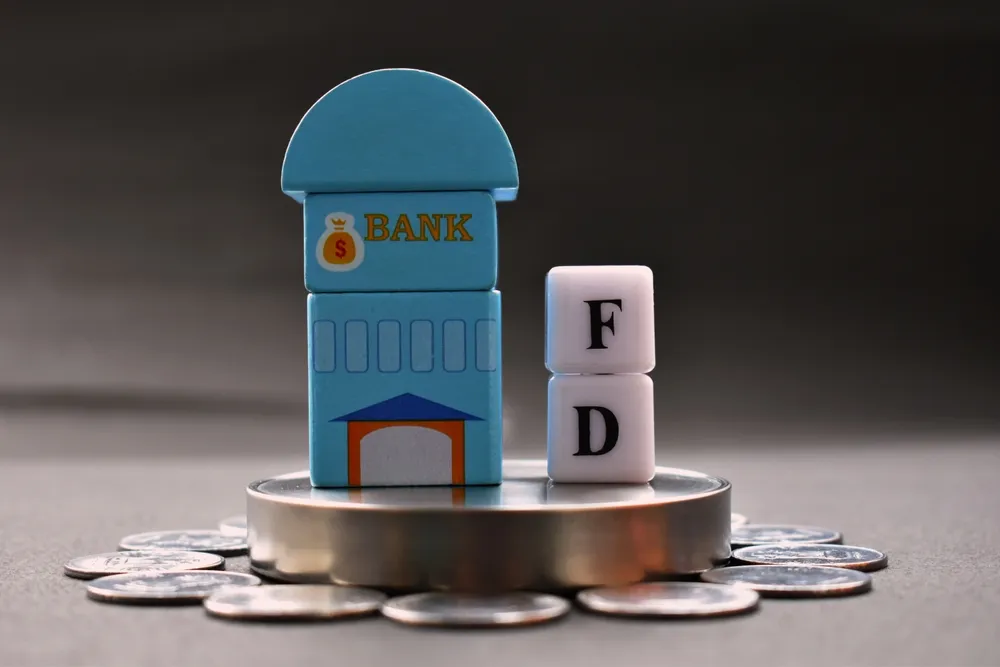Personal Finance News
Is it a good time to invest in fixed deposits amid market correction?
.png)
4 min read | Updated on February 14, 2025, 17:17 IST
SUMMARY
Amid the ongoing decline in the broader market, investors may turn to safer investment instruments like fixed deposits and other small savings schemes that offer an assured return. Fixed deposits are low-risk and low-return instruments but provide balance and comfort in times of market crash.

Many investors rely on low-risk assets like fixed deposits (FDs) for their investments. | Image source: Shutterstock
The recent stock market crash has brought traditional and low-risk investment options, like fixed deposits (FDs), back into focus. As equity markets declined, investors lost over ₹20 lakh crore in the past seven days. Benchmark indices, SENSEX and NIFTY50 have declined more than 3% each so far in 2025.
Volatility is an integral part of stock markets, and investors often strategise their investments according to market trends to minimise losses during a downturn. Amid the ongoing decline in the broader market, investors may turn to safer investment classes like FDs and other small savings schemes that offer an assured return.
Fixed deposits (FDs) are low-risk instruments that provide balance and comfort in times of market crash. FDs and equity instruments cannot be compared in terms of returns as both investment classes serve different purposes. In recent years, mutual funds, ETFs, and other stock-linked instruments have emerged as favourites among investors due to their long-term return appeal. However, many investors still rely on low-risk assets like FDs for their investments.
Low-risk investments
Fixed deposits are low-risk instruments compared to stocks and other equity investment assets. The FD schemes offer guaranteed returns and thus bring stability to the portfolio. These instruments assure minimum returns from an investment at a predefined rate. The FDs in your investment portfolio could be helpful to minimise the losses in equity investments to some extent, especially during a market crash.
Best option for short-term goals
As fixed deposits give guaranteed income, these instruments are the best for meeting short-term goals. For example, if you need money for travel plans after six months or need funds for your child’s admission in a year, fixed deposits help meet those expenses as investment value does not erode, and you get assured income at maturity. The banks and non-banking financial companies (NBFCs) are offering FDs of different tenures ranging from 6 months to 10 years with varied interest rates based on the amount and the duration.
Flexibility
Investors can withdraw the money any time before the end of tenure or prematurely in case of a financial emergency. However, premature withdrawal in the case of certain FDs may attract a penalty. Banks and NBFCs are also offering FD schemes to meet the needs of customers from various income groups, which can help investors choose suitable plans according to their investment horizon and amount. Almost all banks are also offering higher interest rates to senior citizens on FDs.
RBI insures deposits of up to ₹5 lakh in case of defaults
The RBI provides insurance for deposits of up to ₹5 lakh (including interest component) through its deposit insurance scheme in case of defaults or bankruptcy. This provides peace of mind as depositors are assured of getting up to ₹5 lakh even if a bank is liquidated or put under RBI’s "All Inclusive Directions" due to some financial crisis.
Attractive returns and tax benefits
Fixed deposits give safe returns over a short time and also offer tax benefits. By investing in a 5-year FD, one can get a tax deduction under Section 80C of the Income Tax Act, 1961, helping save on taxes while earning guaranteed returns.
| Bank | Tenure (7 days to 1 year) | Tenure (1yr to 2yr) | Tenure (2yr and above) |
|---|---|---|---|
| State Bank of India | 3.5% - 6% | 6.8%- 7% | 7%-6.5% |
| HDFC Bank | 3.5% -6.6% | 6.6% - 7.25% | 7% |
| ICICI Bank | 3%- 6% | 6.7% - 7.25% | 6.9% - 7% |
| Bank of Baroda | 4.25% -6.85% | 7% | 7.15% - 6.25% |
| Axis Bank | 3% - 6% | 6.7% -7.25% | 7% - 7.1% |
Interest rates on fixed deposits change with tenure and the amount of investment. Banks offer different interest rates for deposits up to ₹3 crore and above. Also, interest rates vary for senior citizens. Investors should check with a bank for interest rates for a particular tenure and amount.
Top five FDs by small finance banks
| Banks | Highest FD rate | 1-year FD rate |
|---|---|---|
| Unity Small Finance Bank | 9% | 7.85% |
| North East Small Finance Bank | 9% | 7% |
| Shivalik Small Finance Bank | 8.8% | 6% |
| Suryoday Small Finance Bank | 8.6% | 8.25% |
| Utkarsh Small Finance Bank | 8.5% | 8% |
By signing up you agree to Upstox’s Terms & Conditions
About The Author
Next Story

